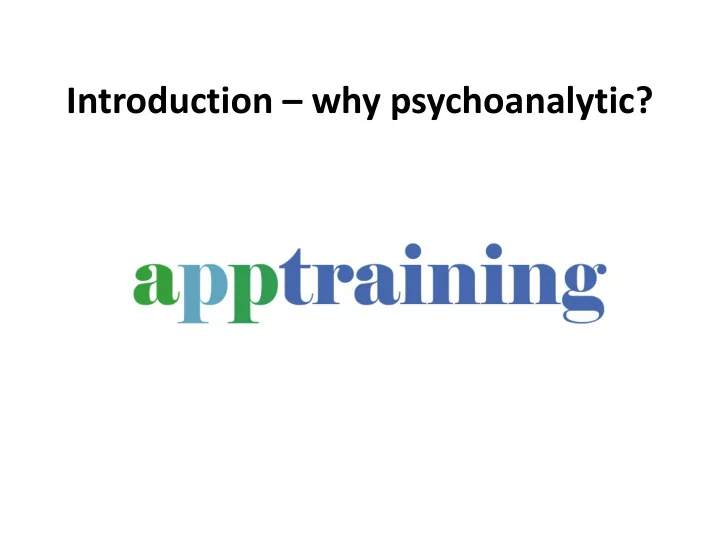

Introduction – why psychoanalytic?
why a training in psychoanalytic psychotherapy? • continuing relevance of psychoanalytic thought and its contribution to individual lives - groups and organisations . • many modalities of talking treatments in past decades • inherited theory from original gene pool of psychoanalysis • further influenced by contemporary psychoanalytic practice in myriad applications • maintain a lively engagement with this root of contemporary thought . • ubiquitous influence of psychoanalysis - politics and society, personal and the collective • contemporary education arts, psychology, applied social sciences
21 st century psychoanalysis - many applications • psychoanalytic practitioner meeting one to one in a room - confidential space set aside for the exploration of the individual psyche. • psychoanalysis influencing the film director and actors who try to convey the inner world of characters, showing what is ‘beneath the surface’. • schoolteachers who have absorbed psychoanalytic theories of child development and attachment - Winnicott / Bowlby - helpful in understanding psychological pressures – obstacles to learning that affect the children they teach.
UBIQUITY OF FREUD’S IDEAS Richard is an enormous magnification of something we find in ourselves as well. We all think we have reason to reproach Nature and our destiny for congenital and infantile disadvantages; we all demand reparation for early wounds to our narcissism, our self-love . Freud essays, "Some Character Types Met with in Psycho-Analytic Work." One of those essays "The Exceptions” 1916
A utomatism working from the unconcious without censorship - SURREALISTS
Artists using art to express inner thoughts, feelings and emotions
Things are never quite what they seem . . . and the unconscious has no past or future, only the present
Perception of reality
Where does apptraining fit in within the field of psychoanalytic trainings? • AGIP founded in 1976 - psychoanalysis firmly established in UK • field of talking treatments cross-fertilised by ideas from the humanistic individual ‘growth’ movements in the USA. • committed to rigorous study of ‘founding theory of psychoanalysis’ • an interest and curiosity towards the contemporary world of psychological enquiry • not part of the psychoanalytic orthodoxy e.g Institute of Psychoanalysis. • forged a different path - ‘pluralism’ - cross-fertilisation of strands of psychoanalytic thought as a creative process - which each trainee psychotherapist synthesises during their studies.
Klein Freud Bion Winnicott Some of the ‘greats’ Fairbairn whom we Jung study on the training alongside
AGIP Is a charity with a commitment to making psychotherapy and psychotherapy training as available as is possible • Fairbridge clinic low-cost scheme offering long term therapy • Non-profit making training courses
Foundations Penelope Balogh – founder of AGIP
The flaming dragon of Penelope Balogh’s dream during the foundation period of AGIP and subsequently discovered on the petrol sign in France – hence the acronym AGIP Dream
The importance of myth and metaphor “It is only a step from the phantasies of individual neurotics to the imaginative creations of groups and peoples as we find them in myths, legends, and fairy tales.” (Sigmund Freud, 1925, p.68). The appt clinical training acknowledges and explores the importance of the metaphorical (metapsychological) aspects of people’s lives. To underline this, at the end of the second year of each trainee’s course, they are required to write an essay based on a myth, fairy tale or legend.
myths folklore legends metapsychology A drawing of dragons in one of the AGIP training rooms
What we offer • UKCP recoginsed psychoanalytic training • the opportunity to consider how psychoanalytic ideas can be applied in different arenas • key aim of developing analytic reflection -increased insight building of more rewarding relationships with self and others
• reflective or analytic capacity applied in any context - one-to-one - group dynamics- organisational – cultural – the arts • commitment to maintain and further the study of psychoanalysis and its application in psychoanalytic psychotherapy • framework understanding why people feel, think and act as they do - or where change may be helpful.
How do you ‘grow’ a psychoanalytic psychotherapist? • integral part of psychoanalytic training - personal therapy • we become our first analytic subject personal experience of therapy foundation practice we build during training. • In this sense psychoanalytic psychotherapy training differs from many other mental health trainings. • We are both subject and object • Insight co-created in conversation between therapist and patient - experience of understanding oneself in the presence of one’s own therapist vital to practice • formulations are important to our work
work paths are varied • private practice and work in many public settings. • NHS AGIP therapists working in neo natal units; bereavement services; psychological services and addiction units • Education: our therapists in Schools & Universities, as therapists, teachers, supervisors and Heads of Counselling Services • work in voluntary and community settings, such as refugee centres, the Irish Centre, and homeless projects such as St Mungo’s • consultancy and training on management; communication; leadership and motivation • members work nationally as practising therapists, delivering training and speaking at conferences including in France and Ireland
Thanks for taking the time to look at this short presentation. Much more information can be found on our web site including in the FAQ section.
Recommend
More recommend